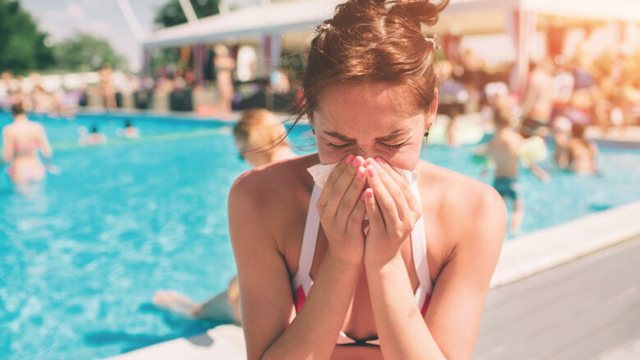
How to distinguish allergies from colds during the summer season and how to protect yourself


Summer pollen is one of the most common causes of seasonal allergies. It is spread by grasses, flowers, and other plants that bloom during the warmer months, and its microscopic particles can cause reactions in sensitive people.
According to the American College of Allergy, Asthma & Immunology (ACAAI, 2024), exposure to pollen can provoke frequent sneezing, runny nose, itchy eyes, and fatigue.
▪ To protect yourself from summer pollen, it is recommended to follow some simple measures:
▪ Staying indoors during peak pollen hours, usually morning and afternoon.
▪ Keeping windows closed and using HEPA air filters (Mayo Clinic, 2023).
▪ Washing hair and changing clothes after returning from outside to remove remaining pollen (Centers for Disease Control and Prevention [CDC], 2023).
▪ Avoid drying clothes outside during days with high pollen counts.
If symptoms appear, doctors recommend:
▪ Oral antihistamines that reduce sneezing and runny nose (Johns Hopkins Medicine, 2023).
▪ Nasal spray with corticosteroids to reduce inflammation and nasal congestion.
▪ Eye drops for itching and watering.
For severe or persistent cases, immunotherapy (allergy shots) may be considered, which helps reduce sensitivity to pollen over time (ACAAI, 2024).
How to distinguish allergies from a cold in the summer
Allergies and summer colds share some symptoms, such as a runny nose, sneezing, and fatigue, but there are clear differences:
The allergy causes clear discharge, itchy eyes, and symptoms persist for weeks or months, as long as exposure to the allergen continues (Mayo Clinic, 2023).
Summer colds, caused by viruses, are often accompanied by mild fever, sore throat, and thicker yellow or green mucus (Johns Hopkins Medicine, 2023).
Another important difference is that colds are contagious, while allergies are not transmitted from one person to another (Harvard Health Publishing, 2024). If symptoms last longer than 10 days and are worse on days when pollen counts are high, it is more likely an allergy than a cold.

The Ukraine summit that ignored the tough questions
ideas
top
Alfa recipes
TRENDING 
services
- POLICE129
- STREET POLICE126
- AMBULANCE112
- FIREFIGHTER128



























